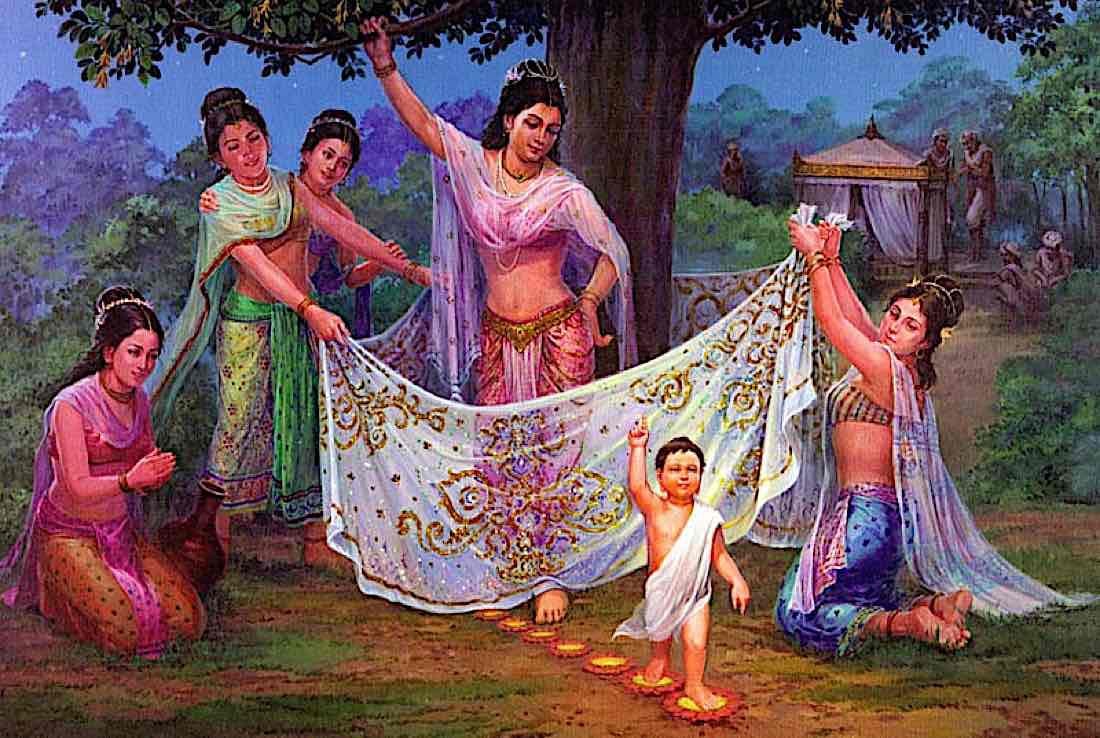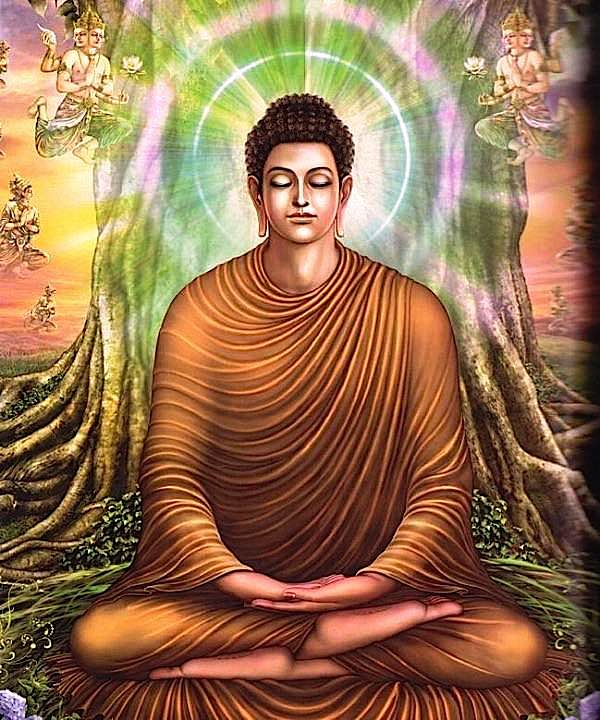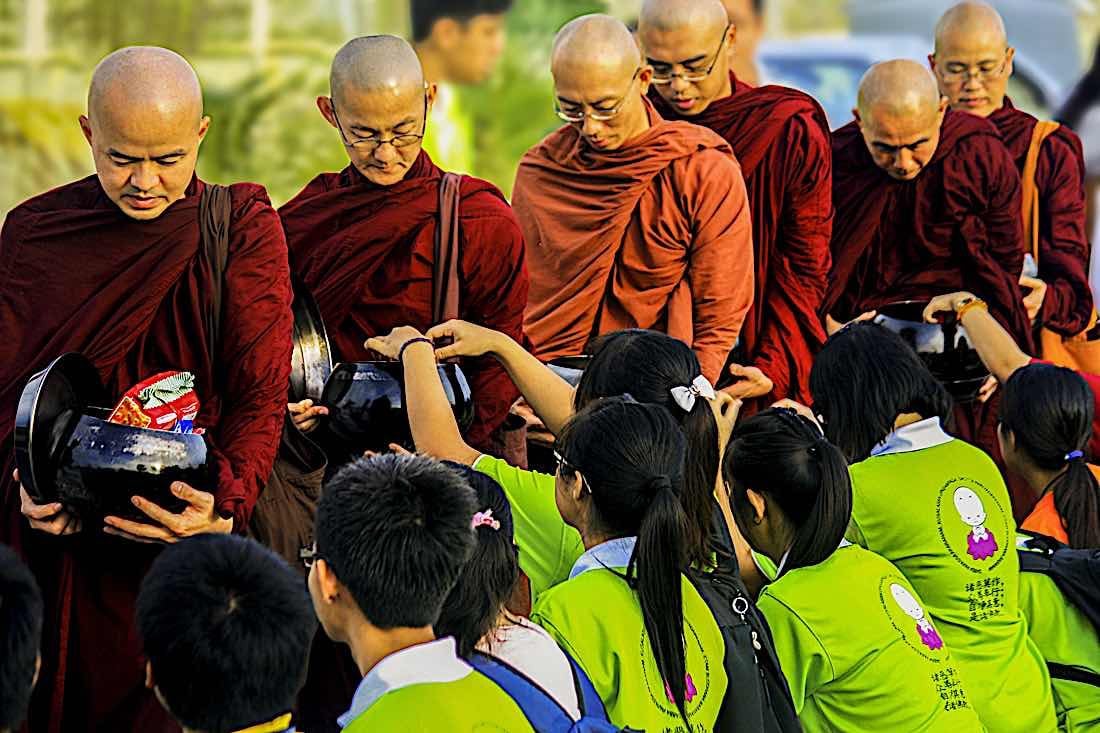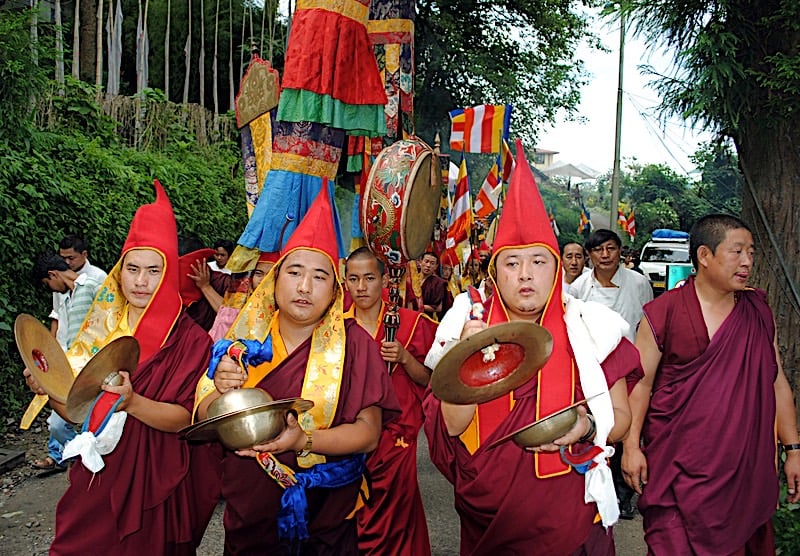
The entire fourth month of the lunar year is meritorious, this year running between May 9 and June 6. On the full moon day (15th day) of this sacred month — this year on Thursday the 23rd– we celebrate Saga Dawa Duchen:
- Birth of Shakyamuni Buddha, the Conqueror
- Enlightenment of Gautama Shakyamuni Buddha
- Buddha’s Paranirvana

Although these events were separated by years, the history of his great life reveals that the three most important events occurred on the full moon of the 4th month. For this reason, according to Lama Zopa:
“Saka Dawa Duchen is one of the four great holy days of the Tibetan calendar, each of which celebrates an anniversary of Shakyamuni Buddha’s display of extraordinary powerful deeds for sentient beings’ sake. On these four days, karmic results are multiplied by 100 million, as taught in the Vinaya text Treasure of Quotations.”

- The Sacred Month also has multiplied merit and this year 2024, runs from May 9 – to June 6 (Month 4 of Lunar Calendar)
- Saga Dawa Duchen, the Birth, Enlightenment and Paranirvana Day celebrated on the full moon of the 4th month: May 23, 2024
Did you know?
- Many Buddhists engage in acts of generosity, such as giving to the poor and freeing animals
- Reciting mantras and reading Buddhist scriptures are common practices on this day
- Lighting butter lamps and making circumambulations around stupas are traditional observances
- Tibetans often refrain from eating meat during the entire month of Saga Dawa
- The month of Saga Dawa is considered a time for increased spiritual practice and reflection
- Saga Dawa Duchen is a public holiday in Tibet and other regions with significant Tibetan Buddhist populations
- The festival promotes the values of compassion, kindness, and mindfulness

Merit of Paramitas
Increased merit activities include any of the Paramitas:
- Generosity of Dana, supporting Dharma activities, helping “Spread the Dharma”– for instance, buying, coping, and circulating sutras, supporting Dharma centers, becoming a patron of a teaching event and so on.
- Another powerful form of generosity during Saga Dawa Duchen is Life Release, the practice of saving lives of animals destined to be killed. This act is believed to extend one’s own lifespan and foster positive karma. Imagine setting free a bird or fish, granting them a new lease on life—it’s profoundly symbolic and spiritually uplifting.
- Participating in fasting retreats is also highly regarded. During these retreats, you abstain from meals for a specified period, focusing instead on prayers and meditation. This not only purifies your body but also sharpens your spiritual focus.
- Lighting butter lamps is another common practice. Each lamp lit is a symbol of enlightenment and wisdom, guiding souls towards the light of Dharma. It’s a simple yet deeply meaningful act.
- Reciting spiritual texts, especially those that involve praises to deities like Tara or rituals such as the Mamo Pacification Ritual, also yield immense merit. Reading these texts aloud not only transforms your own mind but also benefits all sentient beings through the power of spoken words.
- Supporting Dharma centers by attending their events or even making regular donations can further your spiritual journey while ensuring the longevity of these crucial institutions. Your contribution helps keep the teachings accessible to everyone and maintains a sacred space for practice.
- Sponsorship of religious activities, such as funding rituals or ceremonies aimed at invoking blessings and protection for all beings, is another meritorious act. These activities often require funds to purchase offerings and make arrangements, and your sponsorship can make these events possible.Engaging in these practices during Saga Dawa Duchen not only elevates your own spiritual state but contributes to the collective merit and well-being of all sentient beings. Remember, every act of generosity, no matter how small, multiplies a hundred million times during this auspicious period. So, seize the opportunity to do good and spread the light of Dharma far and wide.

Saga Dawa Duchen
The most important day in the month (perhaps for the entire year, for many Buddhists) is Saga Dawa Duchen on the full moon. Duchen means “great occasion,” and this year falls on the full moon day, May 23rd. It is similar to Vesak in Theravadin Buddhism — celebrating the birth, Enlightenment and Paranirvana of Shakyamuni Buddha, but is based on the Tibetan lunar calendar. Both are the “4th month” of the lunar calendars, but they are calculated differently. (See this feature on lunar confusion for clarification>>)
The day of the “Great Occasion” this year on May 23, 2024 is the best day of the entire year for “making merit” for the benefit of all sentient beings. In addition to the 8 precepts, other activities recommended include:
- Strongly recommended by Lama Zopa: do a Shakyamuni Buddha Puja. There are long and short forms of this Puja, downloadable here from FPMT>>
- Reciting the Sutra Remembering the Three Jewels [For a feature on the benefits of reciting sutra out loud, see this special story>>]
- Your regular daily practices.
- Reciting sutras, such as Vajra Cutter Sutra, Sutra of Golden Light, and Sanghata Sutra
- Reciting other prayers, such as Chanting the Names of Manjushri, and King of Prayers
- Undertaking Nyung nes
- Performing self-initiation, for those who fulfilled the necessary prerequisites (normally only for people who have completed a particular retreat protocol and fire puja.)
- Performing Lama Chopa, and at either the beginning of the practice or during the lamrim section, you can meditate on emptiness
- Reciting the names of the Thirty-Five Buddhas, with prostrations
- Reciting Vajrasattva mantras
- Reciting OṂ MAṆI PADME HŪṂ with bodhichitta
- Meditating on emptiness and dependent arising
- Meditating on bodhichitta
- Practicing tonglen
- Rejoicing
- Liberating animals
- Listening to Dharma teachings (live or online is fine).
Taking the 8 Precepts for a day
The late, great Lama Zopa recommends taking the full 8 precepts — the precepts of a monk or nun (not necessarily shaving the head) — for the day. Traditionally, lay disciples follow five of the precepts — but for the day they take all eight. This should be done in the early morning (earlier the better!) He explains:
“Taking the eight Mahayana precepts is a way to make life meaningful, to take its essence all day and night, by taking vows,” Lama Zopa Rinpoche has taught. “It is so simple. It is just for one day. Just for one day. It makes it so easy.”
Here is a video of Garchen Rinpoche offering Refuge Vow:
You can certainly take the precepts simply by action and conscious decision. You don’t have to take formal precepts. Just set your mind and, for the day, ensure you do your best:
1. I undertake to abstain from causing harm and taking life of any kind
2. I undertake to abstain from taking what is not given.
3. I undertake to abstain from sexual misconduct.
4. I undertake to abstain from wrong speech: telling lies, deceiving others, manipulating others, using hurtful words.
5. I undertake to abstain from using intoxicating drinks and drugs, which lead to carelessness.
The additional precepts on Wesak and other special ceremonial days (or for non-lay practitioners all the time) are:
6. I undertake to abstain from eating at the wrong time—the correct time is after sunrise but before noon.
7. I undertake to abstain from singing, dancing, playing music, attending entertainment performances, wearing perfume, and using cosmetics and garlands or decorations.
8. I undertake to abstain from luxurious places for sitting or sleeping, and overindulging in sleep.
Please be aware that by taking the lineage of the eight Mahayana precepts from Lama Zopa Rinpoche, Rinpoche will become one of your gurus.” You can download the PDF text for recitation along with Lama Zopa here>>
-
- Prajna (Wisdom): Understanding the true nature of reality, leading to enlightenment.
- Sila (Morality/Discipline): Ethical behavior and adherence to moral precepts.
- Virya (Energy/Perseverance): Diligence and effort in pursuing spiritual goals.
- Kshanti (Patience): Cultivating tolerance and forbearance, even in difficult situations.
- Upaya (Skillful Means): Applying wisdom and compassion effectively to help others.
- Samadhi (Meditative Concentration): Developing deep states of focused meditation and mental clarity.
- Karuna (Compassion): Developing a deep sense of empathy and care for the suffering of all beings.
- Mudita (Sympathetic Joy): Rejoicing in the happiness and success of others.
- Upeksa (Equanimity): Maintaining mental calm and balance, regardless of external circumstances.
- Danaparamita (Generosity): The practice of giving selflessly to support others.
- Dana (Generosity): You can make donations to a local Buddhist temple, or sponsor the lighting of butter lamps as a part of your offerings.
- Sila (Good Conduct): Be conscious about leading a life of morality, by being truthful and not inflicting harm on others. This could involve activities like helping others in need.
- Kshanti (Patience): Practice patience through understanding and forgiving others, regardless of the difficulties.
- Virya (Diligence): Break out of comfort zones and commit to reading or reciting spiritual texts or sutras during Saga Dawa to obtain merit.
- Dhyana (Meditative Concentration): Engage in longer meditation sessions or join a fasting retreat, helping you to develop a deeper sense of peace and tranquility.
- Prajna (Wisdom): Take time to study the teachings by revered Buddhist figures or Lama Zopa Rinpoche’s recommended practices for Saka Dawa Duchen.
- Upaya (Means or Expedient Measures): Offer your help towards organising religious events, circulating sutras, or helping in any other tasks required during Saga Dawa celebrations.
- Pranidhana (Resolution or Vow): Make a conscious resolution to refrain from negative actions and increase positive behaviors during Saga Dawa, since each action’s merit is multiplied.
- Bala (Power or Spiritual Potency): Engage in practices such as Mamo Pacification Ritual, and other rituals to praise the Glorious Goddess, harnessing the spiritual power of these rituals.
- Jnana (Knowledge): Strive to enhance your knowledge about Buddhism by studying scriptures, listening to teachings and engaging in thoughtful discussions with fellow practitioners during Saga Dawa.

